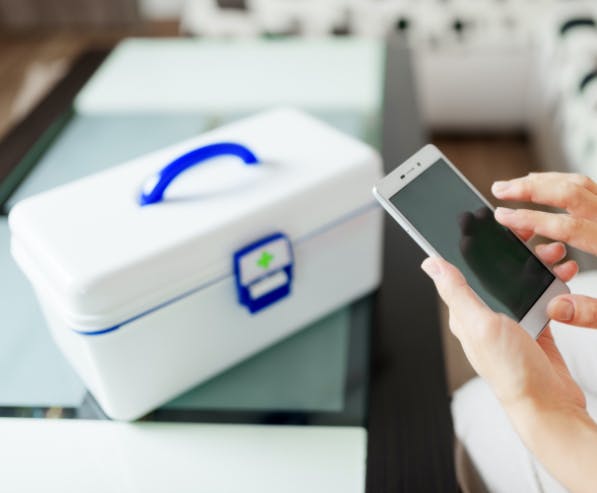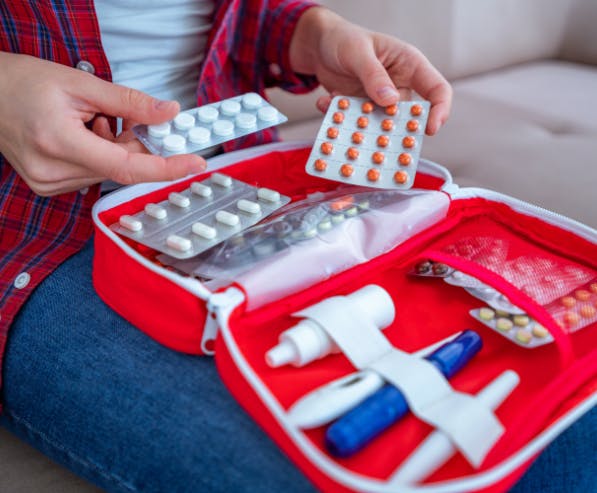How to Store Medicines Safely
Storing medicines safely at home is essential to treating any illness right. Medicine that’s damaged or stored incorrectly may not work as it should and it’s just as important to make sure the medicine is kept out of reach from children and pets.
Learning how to store medicines correctly helps to keep every member of your house safe – whether they walk on feet or paws! Even well-tolerated painkillers like paracetamol or diclofenac gel can have dangerous effects when stored incorrectly.
Unsure if you’re storing medicine in the right way? Then read on, as we’ll cover how to store medicines safely at home, on the go, around children and pets, and what to do if your medicine is damaged.
What Happens If You Don’t Store Medicines Correctly?
If you do not keep medication correctly, pills may be damaged or expire faster, which can make them unsafe to take.
Exposure to air, light or moisture can all damage your medication so it’s essential you know how to store them correctly.1
Some medications have special instructions for storage and must be kept in the fridge, away from all sources of light, or in specific containers. Read the instruction leaflet or medicine label carefully to determine if your medication has any special storage requirements and if you’re still uncertain, have a chat with your doctor or pharmacist.
How to Make Sure You’re Storing Medicines Safely at Home
Making use of a cabinet or medicine box with a child lock is the most effective way to keep little hands away from potentially dangerous substances.
If you are like most people, you may be storing medicines in your bathroom’s medicine cabinet or shelf. This is not recommended! Storing medicines in the bathroom exposes them to heat and moisture from your shower, bath and sink which may damage your medicines or make them less potent2.
A top tip from pharmacists is to store medicines in your bedroom wardrobe or dresser instead, away from sources of heat, light or moisture.3 Ideally you should keep tablets in a medicine box with a child-proof latch somewhere that little hands can’t find reach4 to prevent potential accidents.
Do's
✓ Keep medicine stored in their original packets or containers
✓ Store tablets with a child lock or safety latch and keep them out of reach or sight of children and away from pets
✓ If your medicine needs to be stored in a cool, dark, dry place, choose a bedroom dresser or wardrobe that’s out of reach of little hands and paws!
✓ If your medicine needs to be refrigerated, avoid the lowest shelf, back, and side walls as there is a risk your medicine could freeze. Keep the medicines in an airtight container with a child-lock if necessary.6
Don'ts
X Avoid tablet storage near sources of heat or humidity like kitchens, bathrooms, sinks or near radiators
X Never remove medicines from their original packets or containers
X Never leave your medicine exposed to sunlight or other light sources
X Never store multiple medications in the same medicine box or vial as this prevents you from seeing the expiry date and increases the chances of you swallowing the wrong pill
How to Store Medicines Safely on the Go
When travelling, it is always recommended to take a medicine box or first aid kit with you. This may include common medications to treat the symptoms of flu or colds, pain relievers, and antihistamines in case you have an allergic reaction to pollens, insect bites or other.
But do you know how to keep medicines stored safely when travelling?7
✓ Always keep your medicines in a carry-on bag and keep it with you at all times
✓ Always keep your medicines in their original packet or container
✓ If you’re bringing prescription medication, save your doctor’s name and number
X Never store your medicines in the glove compartment of your car or in the boot
X Never mix medications in the same container, even if it’s more convenient for travel
How to Keep Children Safe around Medicines
Children may end up taking unsafely stored medicines by accident – this can be very dangerous and potentially fatal. Storing medicines correctly out of reach and sight from children in a child proof medicine cabinet can help avoid this.
Follow our tips on how to keep children safe from medicines8:
✓ Always store medicines in a child proof medicine box away from children’s sight or reach
✓ Always ask your pharmacist for containers that are child proof
✓ Always screw the lid back on tightly
✓ Always give medicines to young children yourself instead of letting them take it
X Never call medicines “candy”, “sweet” or “juice” in front of children
X Never leave children unattended near your medicine cabinet
If you suspect a child has ingested a medicine by mistake or had access to a medicine cabinet, medicine box or medicinal packet then call emergency services and seek medical advice immediately.

How to Keep Pets Safe around Your Medicine Cabinet
Just like humans, your beloved pets are at risk of drug interactions, overdose and toxic effects from medication.
Painkillers are especially important to keep stored safely as ibuprofen is the most commonly ingested human medication that pets accidentally swallow.9
✓ Keep medication stored well out of the reach of pets and avoid leaving pill bottles on tables or cabinets where paws are liable to get at them!
✓ When applying topical medication like diclofenac gel, make sure your pet doesn’t lick your skin
X Don’t rely on a child safety-lock to protect your pets. Dogs can chew through medicine bottles and swallow medication
X Don’t store medication for pets and humans in the same place – this can help you avoid a mix up10
How To Identify and Dispose of Damaged Medicine
When you store medicines incorrectly, the packaging may get damaged, exposing the contents to the air which can cause the medication to stop working, work less effectively or make you unwell.11 Always have a quick check that the packet is in good condition without tears, discolouration or any signs it has been damaged.
Before Taking Any Medicines, Always Check12:
✓ That the medicine is in its original packet and the packet is in good condition
✓ The medicine’s expiry date – we suggest checking your medicine box for expired medication every few months
Do not take:
X Medication that has changed colour, texture, smell, or size even if it hasn’t expired
X Pills, tablets or capsules that stick together, are cracked or chipped, or feel harder or softer than usual
How to Safely Dispose of Medicines
If you think the medicine’s package, container or the tablet storage box has been damaged, or if the medicine looks, smells, or feels different to how it normally appears - then the next step is to return them to pharmacy.
To get rid of damaged, expired, or old medicines, place them in a clear plastic bag, seal it, and take them back to your local pharmacy, where staff can safely dispose of it.
Don’t throw medicines into household waste or flush them down the toilet, as this can be harmful for our water systems and wildlife.13
Never taken medicine back to the pharmacy before? Read more on how to return medicines here.
Whatever’s on your mind, we can put it right. Let’s Store it Right.
SHARE THIS ARTICLE
1 Patient instructions, medlineplus, https://medlineplus.gov/ency/patientinstructions/000534.htm 23/07//21
2 Storing Your Medicines, Medline Plus, https://medlineplus.gov/ency/patientinstructions/000534.htm Accessed 28/06/21
3 Supply, Storage and Safe Disposal of Medicines Policy, NHS, https://www.bcpft.nhs.uk/about-us/our-policies-and-procedures/m/981-medicines-supply-storage-disposal/file accessed 23/08/2021
4 Paracetamol GDS (v7) – P25 accessed 23/08/2021
5 Storing Your Medicines, Medline Plus, https://medlineplus.gov/ency/patientinstructions/000534.htm Accessed 28/06/21
6 Top tips to store medications in the fridge, Medangel, https://medangel.co/blog/top-tips-to-store-medications-in-your-fridge-4681af36f08b/ accessed 23/07/21
7 Storing Your Medicines Safely, NCFH, http://www.ncfh.org/uploads/3/8/6/8/38685499/storingyourmedicinessafely.pdf Accessed 28/06/21
8 How To Store Medicines Safely, Parent Map, https://www.parentmap.com/article/store-medicines-safely-from-kids Accessed 28/06/21
9 Keeping pets safe around medicines, Pet Professional, https://www.petprofessional.com.au/info-centre/keeping-pets-safe-around-medicines/ accessed 24/08/21
10 Properly Store Medications to Keep Your Pet Safe, FDA, https://www.fda.gov/animal-veterinary/animal-health-literacy/properly-store-medications-keep-your-pet-safe Accessed 02/09/2021
11 Storing Your Medicines, Medline Plus, https://medlineplus.gov/ency/patientinstructions/000534.htm Accessed 29/06/21
12 Storing Your Medicines, Medline Plus, https://medlineplus.gov/ency/patientinstructions/000534.htm Accessed 29/06/21
13 Storing Your Medicines, Medline Plus, https://medlineplus.gov/ency/patientinstructions/000534.htm Accessed 29/06/21

Let's treat it right and Panadol
Find out more, including usage and dosage guidance for pain relief treatments, from Panadol.

Let's treat it right and Voltaren
Find out more about the right use of pain relief medicines, including dosing and disposal advice, from Voltaren.




